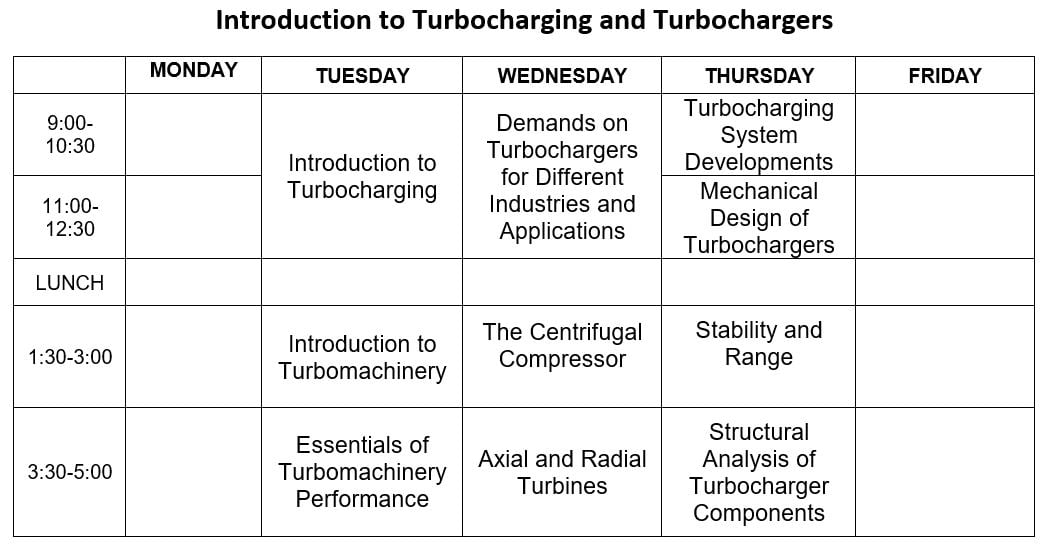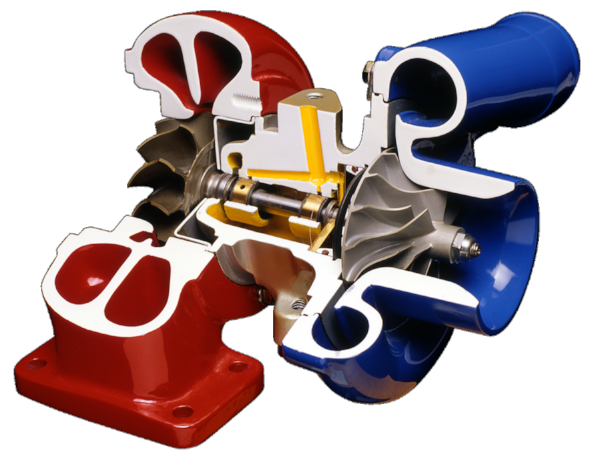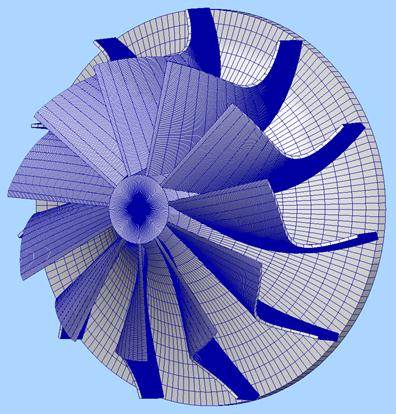Introduction to Turbocharging and Turbochargers Private Course
This is a professional development course dealing with turbocharging systems and turbocharged engines. Basics of compressor and turbine design are covered, with special emphasis on performance, range, and reliability issues as they relate to turbocharging. The course has also been brought up to date to reflect the latest information and trends, including emissions and downsizing requirements. We will also cover hybrid turbocharging that incorporates superchargers and electric machines. It remains a course, solidly based on technical foundations, with a continuing emphasis on understanding the reasoning behind each development. There is something here to engage engineers at all levels.
Length: 3 days
Cost: $24,000 USD Domestic (Continental USA)
$28,000 USD International
Program Outline
Introduction to Turbocharging- Why turbocharge?
- Power boosting
- The turbocharger assembly
- Selection
- How turbomachines work
- Performance of turbomachines
- Momentum exchange
- Energy transfer
- Acceleration and deceleration
- Fluid properties
- Geometry and manufacturing
- Matching
- Turbocharger systems
- Turbocharger Applications
- Impeller
- Inducer region
- Exducer region
- Diffuser Design
- Volutes
- Matching
- Turbocharger systems
- Turbocharger Applications
- Axial turbines
- Radial and mixed-flow turbines
- Design
- Modelling
- Nozzle Design and Analysis
- Variable nozzle geometry
- Volute
- Narrow speed range
- Low-speed torque
- High-speed overboost
- Transient response
- Series and sequential turbocharging
- Electric assist, eBoosters
- Turbocompounding
- Fundamentals
- Steady stress, plasticity, and rupture in rotors
- Vibration analysis of rotating components
- Fatigue
- Creep
- Test stand versus engine testing
- Pipe and duct losses
- Nonuniform inflow and steady effects
- Pulse flow in turbines
- The fundamentals of turbocharger systems and why they are used
- The basics of radial compressor design and how it applies to turbocharged systems
- Turbine design considerations in turbochargers
- Turbocharger and engine interactions
Agenda
Optional Materials (Additional Charges Apply)
- The Fundamentals of Turbocharging textbook by Nicholas C. Baines
- Course materials on a USB drive
Instructors:
Mark Anderson
Mark Anderson is Chief Technology Officer at Concepts NREC. He has almost 30 years of experience in turbomachinery design and fluid modeling. He earned his B.S. in Mechanical Engineering from Northeastern University and a M.A. from the Massachusetts Institute of Technology. Mr. Anderson has conducted a wide range of research in the areas of hypersonic propulsion, turbomachinery modeling, and computational fluid dynamics. He spearheaded Concepts NREC’s meanline development, geometry parameterization, and quasi-3D and full 3D CFD, and was Vice President of Software Development for 10 years. He has authored or coauthored over 25 papers on turbomachinery, CFD, and environmental modeling.
Carl Fredriksson
Mr. Fredriksson has a B.S. in Mechanical Engineering and has over 20 years of turbocharging experience. He began working with Concepts NREC in 1999 and has published several papers on turbochargers. Carl’s focus is on bridging the gap in know-how between the piston engine and the turbocharger. His involvement in turbochargers ranges from direct engine application solutions to turbocharger design for automotive, truck, and locomotive applications.











